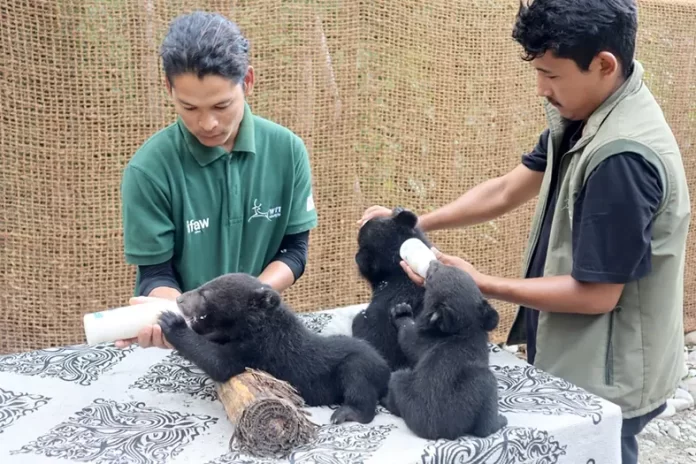SEIJOSA, 12 May: The Wildlife Trust of India (WTI) team at the Centre for Bear Rehabilitation and Conservation (CBRC) in Pakke Tiger Reserve here has had their hands full with back-to-back arrival of Asiatic black bear cubs.
Over the past two weeks, five young cubs have been rescued from different regions of Arunachal Pradesh and are now under specialised care at the CBRC, which is jointly run by the WTI, the state Environment and Forest Department, and the International Fund for Animal Welfare (IFAW).
The first rescue occurred on 2 May, when two female bear cubs were spotted near an agricultural field in Sitang village. The Mehao Wildlife Sanctuary team responded swiftly and relocated the cubs to the mini-zoo-cum-rescue centre in Roing for temporary care. The cubs’ mother is suspected to have fallen victim to poaching.
On 8 May, the cubs were officially handed over to the CBRC for care and rehabilitation. The handover took place in the presence of Mehao Wildlife Sanctuary Divisional Forest Officer Mito Rumi, Range Forest Officer Dr Kabuk Lego, and others.
Soon after, the team was alerted to the presence of three more bear cubs discovered in separate locations in Tawang district. One male cub was found in Sherbang village, while two female cubs were located in villages in Dudunghar circle.
The initial sighting occurred on 17 April, when villagers collecting firewood spotted a mother bear with three cubs. However, the mother soon disappeared, and after remaining in the same area for two days, the cubs began wandering into neighbouring villages.
Concerned villagers – unaware of wildlife protection laws- cared for them until help arrived. Once informed, the DFO of Tawang directed that all three cubs be brought to the Lumla range, where they were handed over to the Forest Department.
On 11 May, they were officially transferred to the CBRC by the DFO and the RFO of Tawang, in the presence of CBRC Head Dr Panjit Basumatary. Based on current accounts, there is hope that the mother bear may still be alive in the area.
The CBRC team at the Pakke Tiger Reserve is now providing all five cubs with expert veterinary care and rehabilitation support. Their goal is to prepare the cubs for eventual reintroduction into their natural habitat once they are capable of surviving independently.
“With the arrival of five new bear cubs, we’re intensifying our efforts in nursing, rehabilitation, and possibly identifying multiple acclimatisation sites. Our entire CBRC team – including keepers, veterinarians, and biologists -is preparing to meet this challenge, ensuring that these cubs are well-prepared for their eventual return to the wild. At the same time, we’re actively monitoring the progress of the two cubs released earlier this year at the end of March,” WTI ecologist Dr Subhasish Arandhara said.
Pakke Tiger Reserve DFO Satyaprakash Singh said, “We deeply appreciate the compassion shown by the community towards these young bears. It is essential that we unite in our efforts to ensure the survival of our precious wildlife.”
Dr Basumatary said, “Bear cubs spend between 1.5-2 years under the close supervision of their mothers, and learn vital survival skills. We adopt a similar process at the CBRC through rehabilitation, which includes hand-raising, acclimatisation and weaning alongside regular walks in the forest with experienced biologists and animal keepers, to help them adapt to their surroundings.
“Ultimately, our goal is to reintroduce these cubs into the wild, giving them a second chance at life in their natural habitat,” he said.



